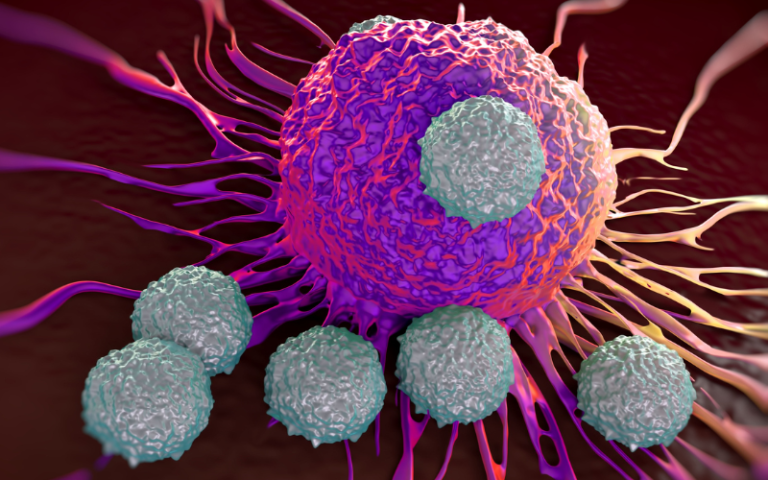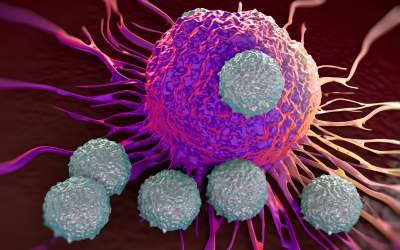Scientists at UCL have engineered a rare type of immune cell to kill slow-growing bowel cancer cells that are resistant to current therapies, a breakthrough that could lead to new treatments in the future.

Bowel cancer is one of the deadliest cancers in the world, causing over 900,000 deaths every year. While chemotherapy can help, it mostly works by killing fast-growing cancer cells. Unfortunately, many bowel cancer cells grow slowly, which means they can evade treatment and come back later, often more dangerous than before.
An alternative way to kill cancer cells is to use engineered immune cells (the body’s natural defence against infection), which have been shown to be successful in treating blood cancers, such as leukaemia.
For this research, published in Cancer Research, scientists at UCL Cancer Institute and UCL Great Ormond Street Institute of Child Health studied a special and far rarer immune cell type known as ‘γδT cells’ (pronounced “gamma-delta T cells”).
They were building on previous UCL work, which found γδT cells can be engineered to kill bone cancer cells; however, they were unsure if similar results could be achieved for tumours found outside the bones.
To do this, researchers took γδT cells from seven healthy people and used a lentivirus to insert a gene into the γδT cells. This enables the γδT cells to produce a special protein called stIL-15 which boosts them, helping the cells survive longer and grow faster. A subset of these engineered γδT cells were also given a B7-H3 antibody, which ‘supercharges’ them, helping the cells recognise and bind to bowel cancer cells that express the B7-H3 protein.
They then combined all these engineered cells with mini tumours, called organoids, from ten bowel cancer patients. Organoids mimic cancers’ harsh environment and how the disease behaves, so scientists can see how treatments might work across a range of patients. They did the same for regular (non-engineered) γδT cells, to see the difference the supercharging made. In total the researchers studied over 1,000 different experimental conditions to understand how γδT cells interact with bowel cancer cells.
The results were exciting. First, researchers found that while regular γδT cells died or became weak when exposed to cancer, the engineered γδT cells could survive for a long time. Second, when the engineered γδT cells used only one method of attack (known as Antibody-Independent Cytotoxicity (AIC)), the cancer cells were able to defend themselves by “re-wiring” the γδT cells – basically tricking the immune cells into being less effective.
However, when the supercharged γδT cells (with the B7-H3 antibody) used two methods of attack (AIC and Antibody-Dependent Cellular Cytotoxicity (ADCC)), the engineered cells were able to restore their wiring and go on to kill the cancer cells – even the slow-growing ones that do not respond to chemotherapy. They also lived far longer and multiplied more.
Corresponding author, Professor Chris Tape (UCL Cancer Institute) said: “This is an exciting step forward. We’ve shown supercharged engineered immune cells can kill bowel cancer cells that are resistant to current clinical therapies. Moreover, by giving T-cells more than one way to attack, we can stop cancer from turning the tables and weakening our immune response.”
He added: “This discovery could lead to new treatments for people with bowel cancer, especially those whose cancer has come back or doesn’t respond to chemotherapy.”
To observe how the γδ T cells and cancer cells reacted, scientists used a powerful ‘phenoscaping’ (single-cell analysis) tool developed at UCL, which creates a detailed map of how cells behave and change.
Corresponding author, Dr Jonathan Fisher (UCL Great Ormond Street Institute of Child Health), who developed the engineered γδT cell technology, said: “These results highlight the power of engineered γδT cells in the fight against cancer. We’ve very excited to build on these findings to develop new immunotherapies for solid cancers.”
Illustration of T-cells attacking cancer cell, Credit Peddalanka Ramesh Babu on iStock
/Public Release. This material from the originating organization/author(s) might be of the point-in-time nature, and edited for clarity, style and length. Mirage.News does not take institutional positions or sides, and all views, positions, and conclusions expressed herein are solely those of the author(s).View in full here.

